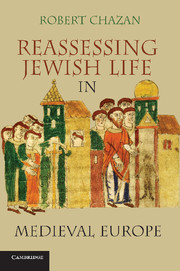Book contents
- Frontmatter
- Contents
- Acknowledgments
- Prologue: Group Narratives: Their Tenacity and Their Accuracy
- Introduction: The Emergence of Medieval European Jewry
- Part I Historical Schemes
- 1 The Jewish Middle Age: The Jewish View
- 2 The Jewish Middle Age: The Christian View
- 3 The European Middle Ages
- 4 The European Jewish Middle Ages
- Part II Historical Themes
- Bibliography
- Index
2 - The Jewish Middle Age: The Christian View
Published online by Cambridge University Press: 05 June 2012
- Frontmatter
- Contents
- Acknowledgments
- Prologue: Group Narratives: Their Tenacity and Their Accuracy
- Introduction: The Emergence of Medieval European Jewry
- Part I Historical Schemes
- 1 The Jewish Middle Age: The Jewish View
- 2 The Jewish Middle Age: The Christian View
- 3 The European Middle Ages
- 4 The European Jewish Middle Ages
- Part II Historical Themes
- Bibliography
- Index
Summary
Christians have viewed jewish history from the parallel perspective of a tripartite Jewish past, with agreement as to the broad time frames of the three periods of the Jewish past and radical divergences as to some of the specifics. There is a somewhat different Christian perspective on the first period of the Jewish past, with a tendency to highlight more prominently than Jews did the shortcomings of the early period of Israelite history. Especially noteworthy is the Christian focus on the purported Jewish role in the crucifixion of Jesus as the ultimate Jewish sin, which ignited final divine outrage and the onset of exilic suffering. Disagreement was more striking with respect to the third period. For Jews, the third period was to see bountiful divine blessings showered upon the long-suffering Jewish people. For Christians, there would indeed be great blessings for the Jews, but they would result from Jewish recognition of the truth of Christianity. Thus, divine bounty would be the fruit of Jewish rejection of Judaism and acceptance of Christianity. It is with respect to the middle period that there is fullest agreement, with both sides in accord on the drastic punishments visited by God upon the Jewish people for its sinfulness. To be sure, the two sides identified the Jewish sins in divergent ways. Nonetheless, whatever the sins specified, the empirical realities were viewed as the same – exile, powerlessness, subjugation, and suffering.
This view of the Jewish past was hardly a minor theme in Christian thinking. It was essential to Christian self-perception and self-worth. Jewish sinfulness, according to Paul and subsequent Christian thinking, resulted in God's rejection of the Jews, which in turn led to the divine turn to the Gentiles, meaning the beginning of Christianity as Paul conceptualized it. Thus, the sequencing of Jewish historical experience actually formed a critical element in Christian history and had to be regularly pondered, clarified, and disseminated to Christian believers. The tripartite division of Jewish history was a key building block in accurate understanding of Christian past, present, and future.
- Type
- Chapter
- Information
- Reassessing Jewish Life in Medieval Europe , pp. 38 - 51Publisher: Cambridge University PressPrint publication year: 2010



